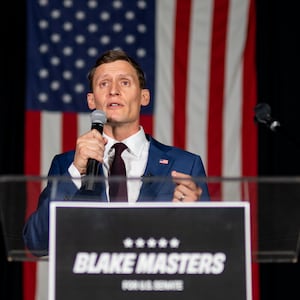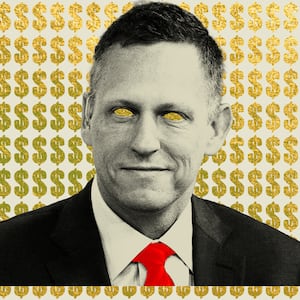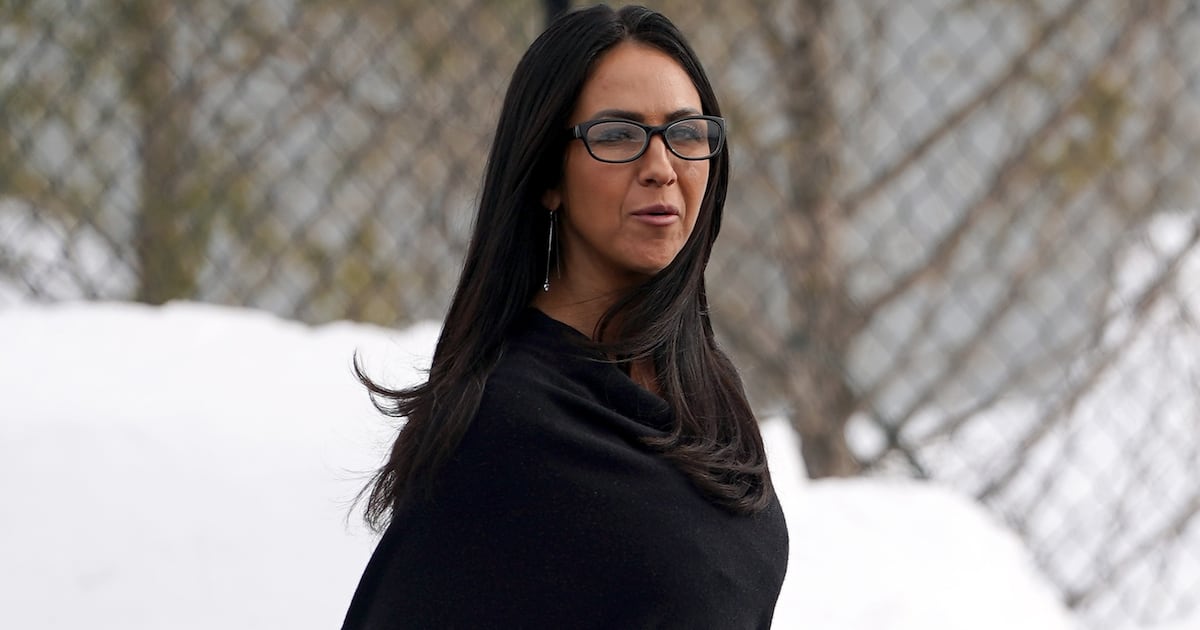PHOENIX—When Arizona Republicans nominated Blake Masters to run against Sen. Mark Kelly (D-AZ), there were signs it marked the beginning of the end of the GOP’s chances to flip one of their most coveted Senate seats.
The 36-year old protégé of far-right tech billionaire Peter Thiel, Masters made it through a contested primary with the backing of Donald Trump. He’d run a campaign so hard-edged and stridently Trumpian that it bordered on “dystopian,” in the words of Chuck Coughlin, a GOP pollster in Arizona.
For months, Masters had struggled to gain traction, and polls showed him losing to Kelly in resounding fashion—some by as much as 10 points. In September, the leading GOP super PAC cut its ad reservations in Arizona in an apparent triage of Masters, and prognosticators like the Cook Political Report moved the race into a less competitive category along with states like Colorado.
With the election days away, however, it’s safe to say Democrats’ hopes for a safe, no-sweat victory in Arizona have disappeared like a Sonoran Desert mirage.
Less than two years removed from his narrow 2020 victory, Kelly is fighting for his political life—and Democrats’ hopes of holding the Senate majority—yet again. Masters has closed the gap in polls and Republicans are growing more bullish on the race.
Despite Masters’ disadvantages as a candidate—and Kelly’s advantages—most Arizona politicos always expected an incredibly tight Senate race in a state that has become one of the nation’s most contested and sharply divided battlegrounds. It also happens to be a state where, in recent elections, polling has failed to indicate the strength of Republican candidates.
“I think we were all caught up in Kelly’s narrative… fighter pilot, astronaut, Gabby [Giffords’] husband, personally appealing guy, and oh, yeah, he’s gonna win,” Coughlin told The Daily Beast. “But what he’s up against is the cycle.”
That “cycle” is one in which Democrats not only face the historical headwinds of being the party in power but must overcome President Joe Biden’s subpar approval ratings and a challenging economic environment dominated by high inflation.
Kelly, of course, would be the last Democrat to expect an easy win in Arizona. On Wednesday, the senator stopped by a campaign office in south Phoenix to greet volunteers who were each making hundreds of calls to voters. “It’s the 1 to 3 percent that really has an impact,” he told them.
Asked afterward why he thinks the race has grown so tight, Kelly told the Daily Beast he doesn’t spend a lot of time looking at polls.
“What I did know is this is going to be really competitive. So I built a campaign to win and to get the message out,” he said. “My expectation was that this will be a competitive election. And my expectation is we’ll be successful.”
The Masters campaign did not make his campaign schedule available or provide comment for this article. But the National Republican Senatorial Committee—which has spent nearly $10 million on attacks against Kelly, more than any other Democrat it is targeting—believes its efforts are having an impact.
“Blake is running a great race and Arizona voters are realizing more and more that Mark Kelly isn’t the moderate, independent voice for Arizona that he’s portrayed himself to be,” said NRSC spokesman Chris Hartline.
While strategists in both parties increasingly see control of the evenly split chamber hinging on three states—Pennsylvania, Nevada, and Georgia—the outcome in Arizona will have significant implications.
Republicans don’t strictly need to beat Kelly to win the majority, but if they do, a GOP majority of 52 seats or more could not only stymie Biden’s agenda but perhaps block it entirely. If elected, Masters is poised to inject a new style of right-wing politics to the Senate, displacing a compromise-oriented Democratic senator.
After winning a primary in which he repeatedly denied the outcome of the 2020 election and trashed GOP leaders like Sen. Mitch McConnell (R-KY), Masters has moderated, but sometimes clumsily. For instance, after calling abortion a “religious sacrifice” in the primary, he has offered several shifting stances on what exceptions he’d allow to a national abortion ban.
Kelly, meanwhile, has been a reliable vote for Democrats but has sought leadership on important local issues like water management, infrastructure, and manufacturing, and he has tried to appeal to Republicans with a more moderate message.
Some observers believe Kelly remains the slight favorite in the tightening race. Coughlin, the GOP pollster, said his instinct is the senator will “hang on” and win over independent voters who tend to decide late in the campaign cycle.
“Looking at historical trends of midterm elections for the party in power, it isn’t a surprise that Arizona is going to be extremely close this fall,” said Ryan O’Donnell, electoral polling director at Data For Progress, which on Wednesday released a poll showing Kelly and Masters tied with 47 percent of the vote each.
“Ultimately this race will come down to who voters believe can best address high prices and inflation which our polling finds is the most important issue to Arizonans for November,” O’Donnell said. “This race is currently within the margin of error, and Senator Kelly goes into this election with a higher favorability than his opponent.”
Indeed, in these hyper-polarized times, Kelly has an unusual advantage: even people who are voting him out don’t seem to dislike him. But the reasons they give for their decisions underscore the deeper issues that are making his re-election more difficult.
At an early voting location in suburban Scottsdale—Brian, a middle-aged man who works in scientific sales and declined to give his last name—stopped by on Tuesday afternoon to cast his vote for Masters. He told The Daily Beast he doesn’t dislike Kelly. He even signaled respect for the senator’s background as an astronaut.
But that résumé made Brian more disappointed at Kelly’s two years in office so far, in which he has largely backed the agenda of President Biden and the Democratic Party.
“I’m a scientist,” he said. “Kelly being an astronaut and a scientist, I thought he’d be more independent. I’m really disappointed.”
Paul Erickson, a Scottsdale resident who works in industrial heating and cooling, didn’t have anything negative to say about Kelly personally, and only mentioned to The Daily Beast he had read discouraging information about the Democrat’s position on immigration.
But Erickson indicated his decision was rooted in concerns about the balance of power in Washington. “It’s very obvious we need a major change,” he said.
Masters, on the other hand, inspires some mix of fear, disdain, and exasperation among those who are not supporting him. Several Democratic voters at the Scottsdale polling place scrunched their faces even at the mere mention of Masters’ name.
“He’s full-on crazy,” said Brian Curry, a Phoenix man who came to the voting location to give cookies to election volunteers.
Coughlin, the GOP pollster, said there was an “antipathy towards Masters” that doesn’t exist with Kelly. But, he said, Kelly is “carrying the desert backpack of Joe Biden, and that’s where Republicans are not going to forgive him.”
To some Democrats who support Biden, this is a baffling state of affairs. When Kelly was speaking to volunteers in Phoenix on Wednesday, he took a question from one woman who asked his advice on what to say to voters while knocking doors. Specifically, “how can we convey the message that President Biden is doing a fantastic job?”
With several reporters present in the room, Kelly managed a quick pivot. “The president is not on the ballot,” he said. “I’m on the ballot… I would speak to folks in terms of the job that I’ve done in the U.S. Senate, delivering for Arizonans.”
Kelly’s supporters, like Phoenix small business owner Carly Rebuck, hope that particular message will resonate with voters over Masters’ hardline appeals to the right and the questions over the senator’s independence.
Despite Arizona’s noisily partisan political climate, Rebuck said she believes there is a quieter majority of voters who will value Kelly’s record and attempts to build bridges with Republicans.
“With Blake Masters, if people think about, OK, who’s actually going to get stuff done, as opposed to the Marjorie Taylor Greenes of the world?” Rebuck said, as she took a break from making calls at the Kelly campaign office on Wednesday.
“If somebody wants to vote for somebody who believes in Arizona, who has done a lot for Arizonans, and actually can work with his party as well as other parties to get legislation and can actually do things for this country,” she said, “I think people will vote for Mark Kelly because of that.”










